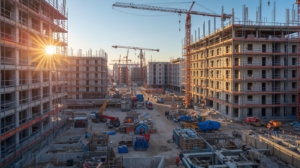The Climate and Resilience Act, promulgated on August 22, 2021, marks a decisive turning point for the construction sector. With its 305 articles, it aims to reduce greenhouse gas emissions by 40% by 2030, by fundamentally transforming construction and renovation practices. Construction professionals are thus faced with new obligations, but also with opportunities for sustainable development.
New obligations regarding construction and renovation
1. Integration of renewable energies and greening of roofs
Since January 1, 2023, new constructions of commercial buildings larger than 500 m² and office buildings larger than 1,000 m² must incorporate green roofs or photovoltaic installations covering at least 30 m² of their surface area. This obligation also extends to outdoor parking areas larger than 500 m², which must be equipped with photovoltaic canopies covering 50 m² of their surface area.
2. Gradual ban on thermal strainers
The law provides for a ban on renting out the most energy-intensive housing according to the following schedule:
- 2025: ban on G-rated housing
- 2028: ban on F-classified housing
- 2034: ban on E-classified housing
This measure strongly encourages the energy renovation of existing buildings.
3. Multi-year co-ownership work plan
Co-ownerships over 15 years old must now develop a multi-year work plan aimed at improving the energy performance of buildings. This plan becomes mandatory depending on the size of the co-ownership:
- From 2023 for co-ownerships of more than 200 lots
- From 2024 for those with 51 to 200 lots
- From 2025 for those with 50 lots or less
The impacts on construction professionals
1. Adaptation to new environmental standards
Construction companies must incorporate the requirements of RE2020, which imposes stricter standards for insulation, material selection, and the carbon footprint of buildings. This requires professionals to increase their skills and adapt their practices.
2. Sustainable development opportunities
The Climate and Resilience Act also opens up prospects for construction professionals:
- Development of new markets linked to energy renovation
- Access to financial aid such as MaPrimeRénov'
- Strengthening brand image through commitment to sustainable development
The Climate and Resilience Act imposes significant changes for construction professionals, both in terms of regulations and economic opportunities. It is essential for industry players to stay informed and adapt quickly to meet new requirements and take advantage of the opportunities offered by this ecological transition.





